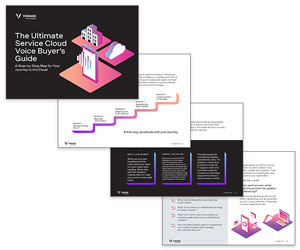In 2020, Call Centre Helper readers were invited to take part in our industry-wide annual survey that looked into ‘What Contact Centres Are Doing Right Now’
In partnership with Business Systems, Jacada, Voci Technologies and Vonage, we asked 28 questions of 310 industry professionals in our survey to discover what contact centres are doing right now.
This article contains the extracted General Chapter of the survey report.
What is the Size of Your Contact Centre?
Our industry professionals that took part in this year’s survey came from over 300 contact centres, of all different shapes and sizes, ranging from 0–30 seats to 1,000+.
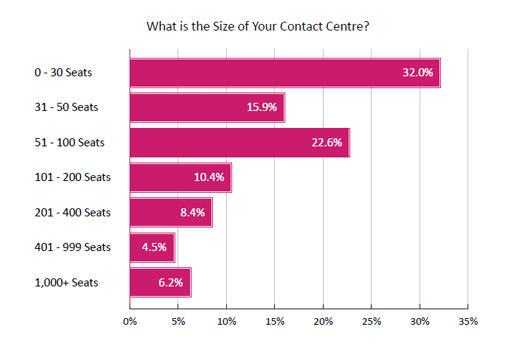
To give greater context to the results shared in this report, the chart above shows the make-up of the different-sized contact centres which contributed to our survey.
What Initiatives Do You Currently Have in the Contact Centre?
Remote Working Has Increased Agent Empowerment
From 2015 to 2019, agent empowerment has been declining in contact centres year after year. But the events of 2020 have put a stop to that worrying trend.
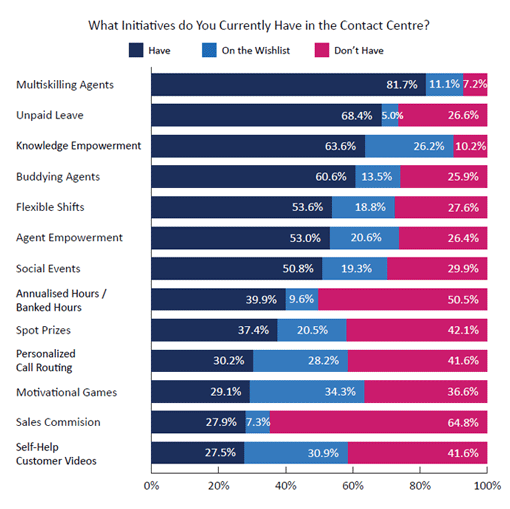
While only 47.9% of contact centres had initiatives around agent empowerment in their contact centre in 2019, this year that figure has risen to 53.0%.
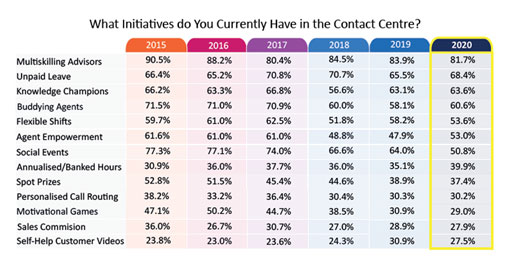
Agent empowerment involves giving agents more control of when they work, how they work and what work they do.
On this first point of “when they work”, it was also encouraging to see a growth in annualized hours schemes, an initiative that is now used by almost 40% of contact centres.
Buddying Agents is Also Becoming More Popular
Another initiative that has seen a resurgence in popularity after a long decline is buddying agents. This initiative is now used by 60.6% of contact centres, up by 2.5% from 2020.
Similarly to agent empowerment, this initiative had previously been declining in usage every year from 2015 to 2019. The recent rise is likely to protect contact centre agents who are now working remotely from social isolation.
Considering the negative effects of social isolation, however, it was a surprise to see that the use of motivational games has in fact decreased from 2019 – as these can be great in bringing people together.
Multiskilling Continues Its Decline
One trend that has not been impacted by the COVID-19 outbreak is that fewer and fewer contact centres are multiskilling agents.
Only 81.7% of contact centres now multiskilling agents, the lowest figure we’ve ever recorded and the fourth year out of five that the percentage has dropped from the previous year.
This trend could well be down to self-service and automation taking away many of the easy contacts from the contact centre, which makes the agent role increasingly difficult. In response, more contact centres seem to be making agents specialists in one specific area.
What Technology Do You Have in Your Contact Centre?
The Chatbot and Virtual Assistant Revolution is Upon Us
For years we have been told about the promise of artificial intelligence (AI) technologies in the contact centre. Well, it seems that the pandemic has caused these technologies to enter contact centres at an accelerated rate, in the form of chatbots and virtual assistants.
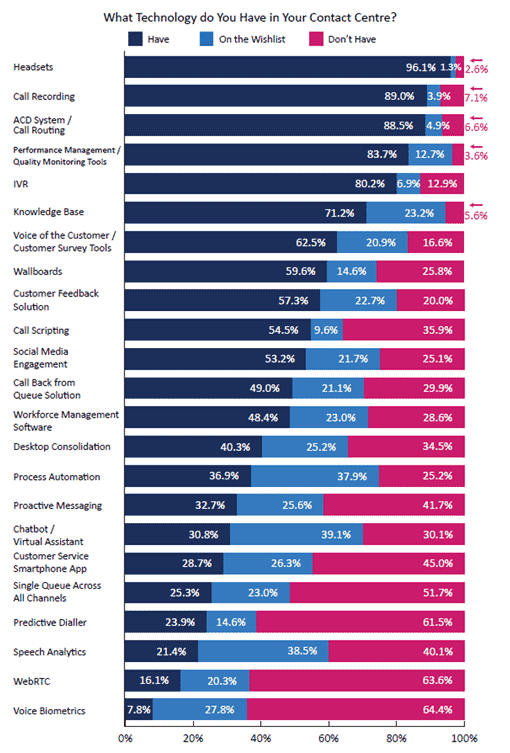
More than twice as many contact centres are using these compared to this time last year – with 30.8% of organizations now implementing either a virtual assistant or a chatbot.
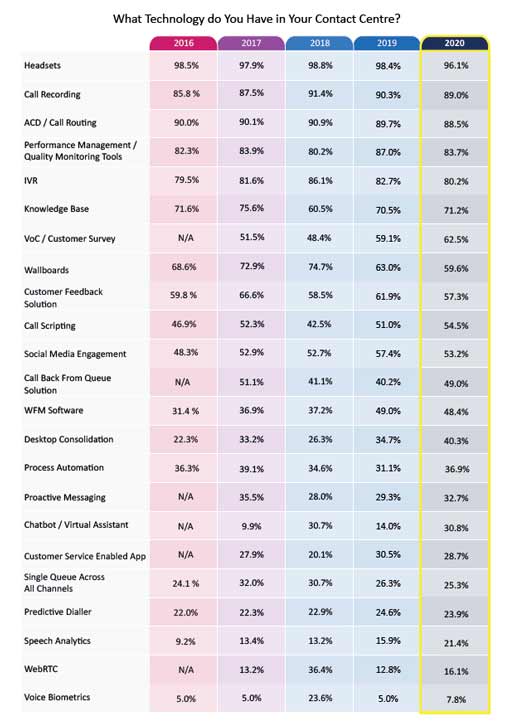
On top of this, other AI technologies are being implemented more too. Well over a third of contact centres have installed process automation technology and 7.8% now use voice biometrics – signalling a big uptake in both AI-based technologies since late 2019.
Contact Centres are Falling Back on Call-Scripting and Knowledge-Base Technology
Since 2018, the use of call-scripting technology has risen by 12.0%, meaning that well over half of contact centres (54.5%) are now using digital call scripts.
While some of this growth might be contact centres moving old-fashioned paper-based scripts to an online setting, it does highlight that more contact centres are feeling the need to provide agents with additional resources to fall back on when calls are not going to plan.
This idea gains momentum when we also consider that 71.2% of contact centres have now implemented knowledge-base technology, which is up from 60.7% in 2018.
These statistics are yet another indicator that the call centre agent role is becoming more challenging.
Customer Feedback Solutions are Falling by the Wayside
One technology that has actually fallen in usage over recent times is customer feedback solutions, as only 57.3% of contact centres are using this technology in 2020, down from 61.9%.
This could indicate that contact centres are looking to gather customer feedback through other methods, and the growth in the uptake of speech analytics technology supports this argument.
Now over one in every five contact centres (21.4%) has speech analytics, which can be used to gather customer insights from the conversations customers are having with agents.
How is Your Contact Centre Perceived by the Rest of the Business?
Perceptions of the Contact Centre are Improving
The percentage of industry professionals that believed their organization viewed their contact centre as either a “source of customer insight” or a “profit centre” grew significantly from 2019.
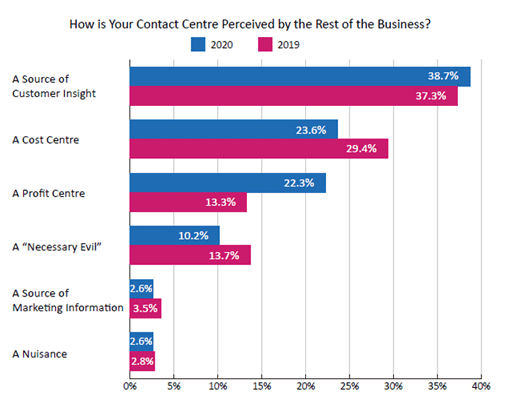
One brilliant statistic is the fact that the number of businesses that view the contact centre as a “profit centre” grew from 13.3% last year to 22.3% this time around. Fantastic!
In a time when many organizations have had to cope with increased contact volumes and accelerate their digital transformation projects, it appears that eyes have been opened to the critical role that contact centres play.
What Barriers Stop You from Running Your Dream Contact Centre?
Unsurprisingly, Budget is the Biggest Barrier to the Dream Contact Centre
More than six in every ten contact centres (60.3%) have a problem obtaining budget, reporting that the issue is preventing them from running their ideal contact centre.
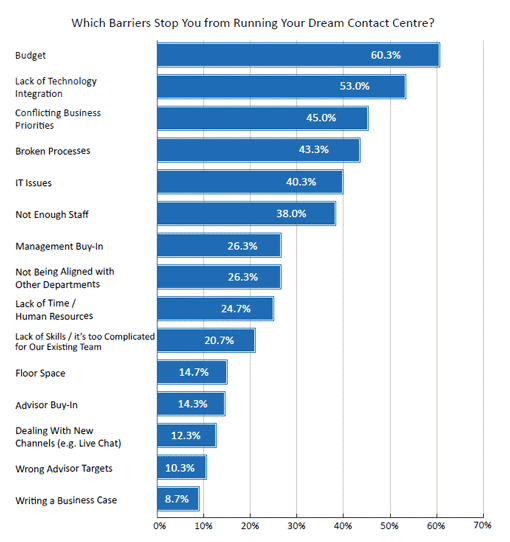
It might be more surprising that only 39.7% of contact centres have no issues with the budget provided to them, as it is quite often the cause behind lots of other problems like the need for new technology, staffing issues and lack of resources.
The second and third most common barriers could also have been easily anticipated: lack of technology and conflicting business priorities.
What are the Most Important Contact Centre Metrics?
Customer Satisfaction Remains the Industry’s Most Popular Metric
Despite the hype around customer effort, customer emotion and customer loyalty-based metrics, customer satisfaction remains the undisputed king of contact centre metrics.
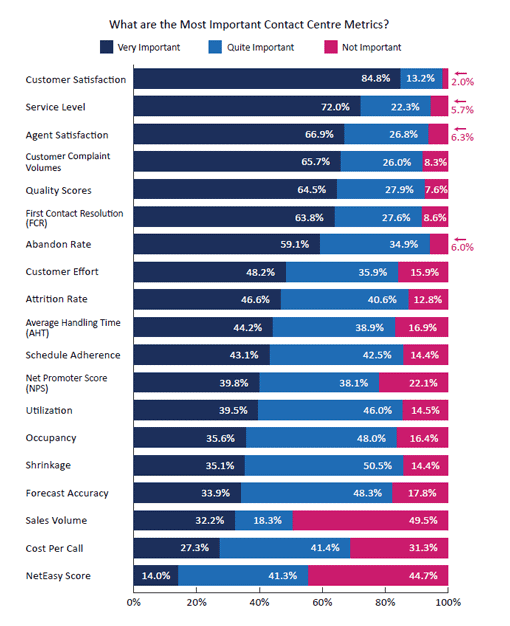
With 84.8% of contact centre professionals believing it to be a “very important” metric, it is, however, not as overwhelmingly “on top” as in previous years.
In contrast, more participants told us that other customer experience metrics like Customer Effort (48.2%) and the Net Promoter Score (39.8%) were “very important” than in 2019.
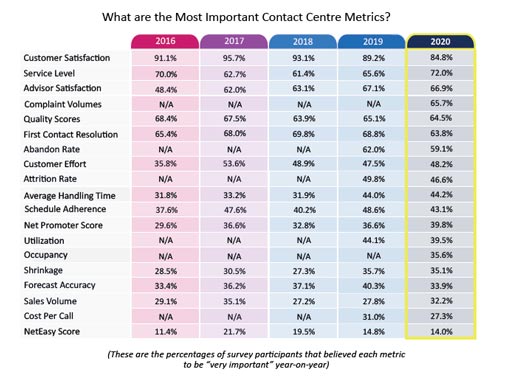
Average Handling Time (AHT) as a Metric Continues to Rise
The percentage of industry professionals believing that AHT is a “very important” metric has grown to 44.2%. This is up from 31.9% in 2018.
This is likely because of the significant role that AHT plays in staffing calculations. Yet it could also be a signal that contact centres are focusing on lowering the metric as a result of the increased contact centre demand brought on by the pandemic.
Interestingly, service level is now deemed to be of greater importance than last year too, with 72.0% of survey participants now believing it to be a “very important” metric.
What Impact Has Remote Working Had on…?
Employee Well-Being and Engagement is Improving
One of the positives from the “new normal” is that the move to remote working has had a largely positive impact on employee well-being and engagement.
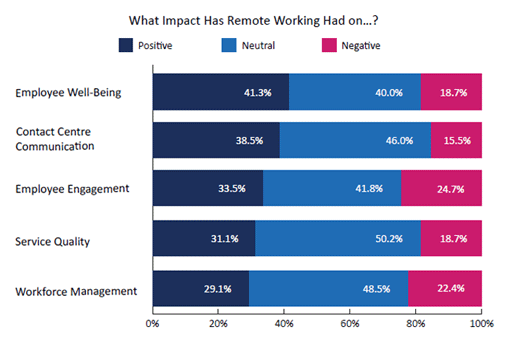
41.3% of contact centres believe that their new working arrangement has improved employee well-being, while 33.5% think that it has also benefited employee engagement.
The other area where remote working has had a beneficial impact is in communication – highlighting that contact centres are using virtual communication channels to good effect.
Follow this link to view the full Call Centre Helper survey report ‘What Contact Centres Are Doing Right Now‘.
Alternatively if you are interested in a specific chapter read one of these extracts next:
This survey was done in partnership with Business Systems, Jacada, Voci Technologies and Vonage.
Related Research
To download the full copies of our ‘What Contact Centres Are Doing Right Now’ survey reports follow the links below:
- What Contact Centres Are Doing Right Now (2023 Edition)
- What Contact Centres Are Doing Right Now (2022 Edition)
- What Contact Centres Are Doing Right Now (2021 Edition)
- What Contact Centres Are Doing Right Now (2020 Edition)
- What Contact Centres Are Doing Right Now (2019 Edition)
- What Contact Centres Are Doing Right Now (2018 Edition)
- What Contact Centres Are Doing Right Now (2017 Edition)
- What Contact Centres Are Doing Right Now (2016 Edition)
- What Contact Centres Are Doing Right Now (2015 Edition)
You can also download the full copies of our ‘Is Your Contact Centre Delivering Exceptional Customer Service?’ survey reports by following the links below:
- Is Your Contact Centre Delivering Exceptional Customer Service? (2020 Edition)
- Is Your Contact Centre Delivering Exceptional Customer Service? (2019 Edition)
- How Contact Centres Are Delivering Exceptional Customer Service (2016 Edition)
For more great information check out our other Contact Centre Research
Author: Robyn Coppell
Published On: 17th Jan 2022 - Last modified: 10th Oct 2023
Read more about - Contact Centre Research, benchmarking, Business Systems, Jacada, Survey, Voci Technologies, Vonage












